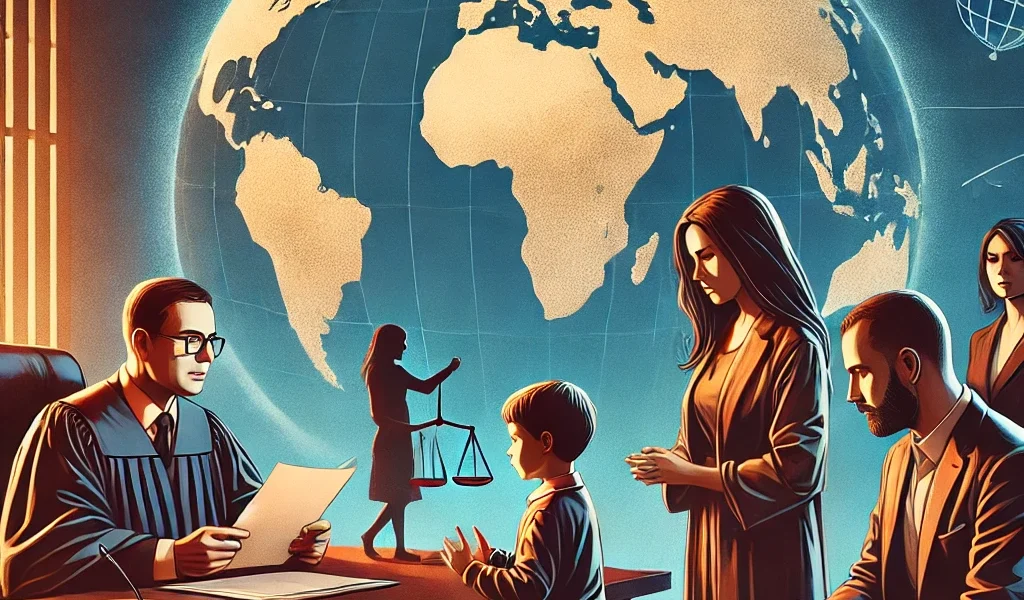Introduction
International child custody cases are complex legal disputes that arise when parents from different countries seek custody of a child. These cases often involve legal systems, international treaties, and cross-border enforcement challenges. Given the emotional and legal intricacies, it is crucial for parents involved in international custody battles to understand the laws, challenges, and potential solutions available.
In this article, we will explore international child custody laws, the key legal frameworks governing such cases, the challenges faced by parents, and the steps that can be taken to protect parental rights while ensuring the best interests of the child.
Understanding International Child Custody
International child custody disputes can arise due to various reasons, including:
- Divorce or separation where parents reside in different countries.
- Parental abduction, where one parent unlawfully takes the child to another country.
- Relocation of a parent for work or personal reasons, leading to custody disputes.
Key Legal Terms in International Custody Cases
- Jurisdiction: The legal authority of a country to hear and decide a custody case.
- Parental Abduction: When a parent takes a child across international borders without the other parent’s consent or legal permission.
- Hague Convention: An international treaty that provides a legal framework for returning abducted children to their habitual residence.
International Laws Governing Child Custody
1. The Hague Convention on the Civil Aspects of International Child Abduction
The Hague Convention of 1980 is a key international treaty designed to protect children from international parental abduction. It aims to ensure that custody disputes are handled in the child’s country of habitual residence.
Key Provisions:
- A child wrongfully taken from one country to another must be returned promptly.
- The custody decision should be made in the child’s home country.
- Exceptions exist if returning the child would expose them to harm.
2. United Nations Convention on the Rights of the Child (UNCRC)
The UNCRC emphasizes that custody decisions should prioritize the child’s best interests and maintain their emotional and psychological well-being.
3. Local and Regional Laws
Each country has its own family laws regarding child custody. Some countries follow Sharia law, while others operate under civil law, common law, or a combination. It is crucial to understand the custody laws of both the child’s home country and the country where the custody dispute is being fought.
Challenges in International Child Custody Cases
1. Jurisdictional Issues
Determining which country’s courts have jurisdiction can be complicated, especially if both parents file for custody in different countries.
2. Parental Abduction and Non-Compliance
Even if a court orders a child to be returned, enforcement may be difficult in countries that are not signatories to the Hague Convention.
3. Cultural and Legal Differences
Custody laws vary greatly by country. In some nations, custody is automatically granted to the mother, while in others, fathers may have more legal rights.
4. Travel Restrictions and Immigration Laws
Visa and immigration restrictions can impact a parent’s ability to visit or relocate with their child.
5. Emotional and Psychological Impact on Children
Legal battles and international relocations can be stressful for children, affecting their mental well-being and stability.
Steps to Protect Your Parental Rights
1. Secure a Custody Agreement in Writing
If you are divorcing or separating from a spouse in another country, ensure that custody arrangements are clearly outlined in a legally binding document.
2. Understand International Treaties
If your country is a signatory to the Hague Convention, you may have legal recourse if your child is taken abroad without consent.
3. Work with an International Family Law Attorney
An attorney specializing in international custody laws can help navigate complex legal systems and treaties.
4. Obtain Travel Restrictions or Court Orders
If there is a risk of parental abduction, you may request a court order preventing your child from being taken out of the country without permission.
5. Seek Mediation and Negotiation
International custody disputes can be resolved through mediation, which is often less adversarial and more child-friendly than litigation.
6. Use Interpol and Legal Enforcement Agencies
If a child is abducted, Interpol, embassy officials, and international law enforcement can assist in locating and returning the child.
Real-Life Case Examples
1. The United States vs. Japan Custody Disputes
Japan has historically been criticized for not enforcing foreign custody rulings, making it difficult for non-Japanese parents to regain custody of abducted children. However, since signing the Hague Convention in 2014, Japan has made progress in handling such cases.
2. European Union Cross-Border Custody Cases
The Brussels II Regulation governs custody disputes within the EU, ensuring that decisions made in one member state are recognized in others.
3. Middle East Custody Laws
Many Gulf countries follow Islamic law, where custody decisions may favor the father, making international custody battles more challenging for foreign parents.
Conclusion
International child custody cases involve complex legal, cultural, and jurisdictional challenges. Understanding the Hague Convention, national custody laws, and the best interests of the child is crucial for parents involved in cross-border custody disputes.
If you are facing an international custody battle, it is essential to seek legal guidance, secure proper custody agreements, and explore mediation options to protect both your rights and the well-being of your child. With the right legal strategy and support, parents can navigate these disputes while ensuring the child’s safety and stability.
FAQs
1. What happens if a country is not part of the Hague Convention?
If a country is not a signatory, retrieving an abducted child may be more difficult. Parents may have to rely on diplomatic channels or local courts.
2. Can a parent relocate internationally with a child after divorce?
It depends on the custody order. In many cases, a parent must seek court approval before moving a child to another country.
3. How long does an international child custody case take?
Cases can take months or even years, depending on legal processes, international cooperation, and whether mediation is involved.
4. Can international custody agreements be enforced worldwide?
Not always. Enforcement depends on the legal framework of the involved countries and their willingness to recognize foreign court rulings.
5. What role does the child’s preference play in international custody cases?
In some jurisdictions, courts consider the child’s preference, especially if they are mature enough to express their wishes.




